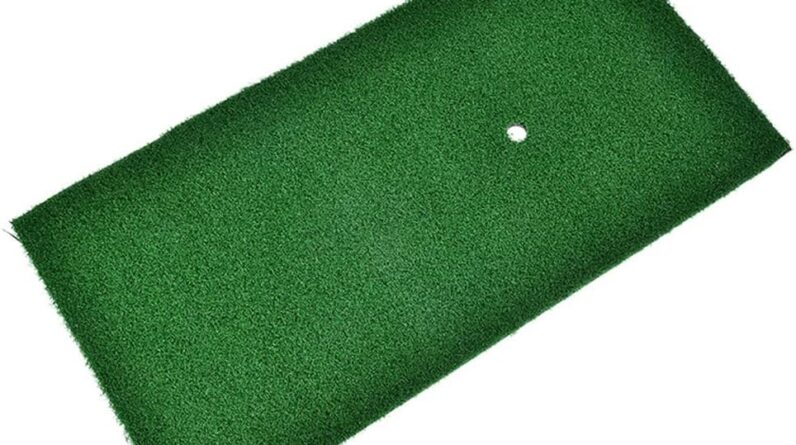If you’re an avid golfer looking to improve your game, one question that’s likely crossed your mind is, “How can I lower my golf handicap?” Whether you’re a beginner or seasoned player, reducing your golf handicap is a common goal among golfers everywhere. In this article, we’ll explore various strategies and tips to help you achieve your desired handicap and enhance your overall golfing experience. So, let’s get started on your journey towards becoming a better golfer and lowering your handicap.

Improve Your Swing
Work on your grip
Having a proper grip is crucial for a successful swing. Make sure your grip is neither too tight nor too loose. The best way to grip the club is to let it rest diagonally across your fingers, with your left hand (for right-handed golfers) slightly turned to the right, and your right hand resting below it. Experiment with different grips to find the most comfortable and effective one for you.
Develop a consistent swing tempo
Consistency is key when it comes to your swing. Focus on maintaining a smooth and rhythmic tempo throughout your entire swing. Avoid rushing or decelerating your clubhead, as this can lead to inconsistent ball striking. Practice swinging at different speeds to develop a sense of tempo that works best for you.
Focus on proper alignment
Proper alignment sets you up for success before every swing. Make sure your feet, hips, and shoulders are all aligned parallel to the target line. This will help ensure that your swing path is on the correct line, leading to more accurate shots. Establish a routine of checking your alignment before every shot to avoid any misalignment that can negatively impact your game.
Master your takeaway
The takeaway is the beginning of your swing and sets the stage for a successful shot. Focus on starting your takeaway with a slight rotation of your shoulders, while keeping your wrists and hands relaxed. Avoid any excessive movements or lifting of the club. A smooth and controlled takeaway will lead to better consistency and power in your swing.
Practice smooth transition and follow-through
A smooth transition from the backswing to the downswing is crucial for a powerful and accurate shot. Avoid any jerky or abrupt movements during this transition. Instead, focus on maintaining a smooth transfer of weight from your back foot to your front foot while maintaining a relaxed grip. Finish your swing with a balanced and controlled follow-through, ensuring that your body rotates fully and your weight transfers onto your front foot.
Develop a Strong Short Game
Focus on chipping and pitching
The short game can make or break your score, so it’s essential to dedicate time to improving your chipping and pitching skills. Practice various chip shots from different lies and distances around the green. Work on controlling the trajectory and spin of the ball to land it close to the pin. Similarly, focus on developing your pitching technique to hit accurate shots from a greater distance.
Master different types of shots
In addition to chipping and pitching, it’s important to have mastery over different types of shots. Practice hitting flop shots, bump-and-runs, and punch shots to handle various situations on the course. Being able to adapt your shot selection to the conditions and obstacles in your way will greatly improve your short game performance.
Improve your putting skills
The saying “drive for show, putt for dough” holds true in golf. Putting can account for a significant portion of your strokes, so it’s crucial to work on your putting skills. Practice different putting drills to improve your distance control, accuracy, and green reading abilities. Focus on developing a consistent putting stroke and maintaining a steady rhythm throughout your putting motion.
Practice bunker shots
Bunker shots can be intimidating, but with practice, you can become a proficient bunker player. Work on your technique, focusing on using the bounce of the club to slide under the ball and lift it out of the sand. Practice controlling the distance and trajectory of your bunker shots to gain confidence and effectively escape from the sand.
Work on distance control
Having control over your distance is essential for scoring well in golf. Practice hitting shots with different clubs from different distances to develop a better understanding of how far you can hit each club. Work on controlling your swing tempo and power to achieve consistent distances with each club. This will help you make better club selections and play more confidently on the course.
Enhance Physical Fitness
Engage in strength training
Strength training can improve your overall golf performance by increasing power and stability in your swing. Incorporate exercises that target the muscles used in your golf swing, such as squats, lunges, and core exercises. Strengthening your upper body, especially your shoulders, will also improve your ability to generate clubhead speed.
Improve flexibility and mobility
Flexibility and mobility are essential for a fluid and unrestricted golf swing. Incorporate stretching exercises and yoga into your routine to improve your range of motion. Focus on stretching your shoulders, hips, and hamstrings, as these areas play a crucial role in your swing. Improved flexibility will allow you to maintain a more consistent and efficient swing.
Build core strength
A strong core is the foundation of a powerful and controlled golf swing. Incorporate exercises that target your core muscles, such as planks, rotational exercises, and medicine ball twists. Building a strong core will improve your stability, balance, and ability to generate power in your swing.
Incorporate cardio exercises
Cardiovascular fitness is important for endurance and stamina on the golf course. Engage in activities such as running, cycling, or swimming to improve your cardiovascular health. Regular cardio workouts will help you maintain peak performance throughout a round of golf and reduce fatigue.
Maintain a healthy lifestyle
In addition to physical fitness, maintaining a healthy lifestyle is crucial for optimal golf performance. Get enough sleep to ensure proper rest and recovery. Eat a well-balanced diet consisting of nutritious foods that provide long-lasting energy. Stay hydrated on and off the course to prevent fatigue and maintain focus. Taking care of your overall health will positively impact your golf game.
Manage Your Mental Game
Develop a positive mindset
A positive mindset is essential for success in golf. Practice positive self-talk and visualization techniques to build confidence and overcome challenges. Focus on the process rather than the outcome, and embrace mistakes as opportunities for learning and improvement. Cultivating a positive mindset will help you stay focused, resilient, and enjoy the game of golf.
Practice visualization techniques
Visualization is a powerful tool that can enhance your golf performance. Before each shot, take a moment to visualize a successful outcome. Imagine the ball flying on the desired trajectory and landing precisely where you want it to. Visualize yourself executing the perfect swing with confidence and control. This mental imagery will help reinforce positive muscle memory and boost your performance on the course.
Learn to manage stress and pressure
Golf can be a mentally demanding sport, especially when it comes to handling stress and pressure. Develop strategies to stay calm and focused under pressure, such as deep breathing or positive self-talk. Practice mindfulness and stay present in the moment, avoiding dwelling on past mistakes or worrying about future outcomes. Managing stress and pressure effectively will help you make better decisions and perform at your best.
Set realistic goals
Setting realistic goals is crucial for maintaining motivation and tracking progress in golf. Identify specific areas of improvement and set achievable goals that align with your current skill level. Break down long-term goals into smaller, manageable steps to ensure steady progress. Celebrate your achievements along the way and adjust your goals as you continue to improve.
Practice mindfulness and focus
Golf requires a high level of mental focus and concentration. Practice mindfulness techniques, such as deep breathing and meditation, to improve your ability to stay focused on each shot. Avoid distractions and maintain a clear mind to make more consistent and precise swings. The ability to stay present and focused will greatly enhance your golf performance.

Play Regularly and Competitively
Participate in tournaments
Participating in tournaments allows you to test your skills against other golfers and gain valuable experience in a competitive environment. Look for local tournaments or events that cater to your skill level and register to challenge yourself. The competitive atmosphere will push you to elevate your game and identify areas for improvement.
Join a golf league
Joining a golf league provides a regular opportunity to play with other golfers and compete in a friendly setting. Leagues often offer different formats and handicap systems, allowing players of all levels to participate. Playing in a league will not only enhance your competitive skills but also provide a social aspect to your golfing experience.
Play with better golfers
Playing with golfers who are better than you can be a valuable learning experience. Observing their technique, strategy, and decision-making will expose you to new ideas and ways to approach the game. Take advantage of opportunities to play with more experienced golfers and seek their advice and insights. Playing with better golfers will challenge you to elevate your game and improve your skills.
Challenge yourself on different courses
Playing different courses exposes you to a variety of challenges and environments. Seek out opportunities to play on courses with different layouts, hazards, and green speeds. This will expand your golfing experience and test your adaptability. Overcoming new challenges will not only make you a better player but also make the game more enjoyable and rewarding.
Set a regular practice routine
Consistency in practice is key to improvement in any sport, and golf is no exception. Establish a regular practice routine that accommodates your schedule and allows for focused practice sessions. Dedicate time to work on specific aspects of your game, such as your swing, short game, or putting. Whether it’s hitting balls at the driving range, practicing chip shots, or putting on a practice green, regular practice will lead to tangible improvement on the course.
Analyze Your Rounds
Track your stats
Tracking your statistics can provide valuable insights into your performance and areas for improvement. Keep a record of fairways hit, greens in regulation, putts per round, and other relevant metrics. This data will help you identify patterns and trends in your game, allowing you to make targeted adjustments and measure your progress over time.
Identify strengths and weaknesses
By analyzing your rounds and tracking your stats, you’ll be able to identify your strengths and weaknesses. Knowing where you excel and where you struggle allows you to allocate your practice time and resources effectively. Double down on your strengths to maintain your advantage, while dedicating extra attention to improving your weaknesses. This targeted approach will lead to more balanced and consistent overall performance.
Assess your course management
Course management involves making strategic decisions on the course, such as shot selection, club choice, and risk assessment. Assess your course management by reviewing your decisions during rounds. Consider whether you made the best choices based on your skill level and the situation at hand. Reflecting on your course management will help you develop a more strategic and intelligent approach to playing each hole.
Analyze your decision making
In addition to course management, analyzing your decision making throughout your rounds is crucial. Reflect on your shot selection, target choices, and risk-reward calculations. Identify any weaknesses or errors in your decision making and work on improving them. Making better decisions on the golf course will lead to more confident and effective shots.
Review your performance with a coach or mentor
Seeking professional feedback is a valuable way to analyze your rounds and identify areas for improvement. Share your rounds and statistics with a golf coach or mentor who can provide objective analysis and guidance. They can offer insights into your technique, strategy, and mental approach, helping you make targeted improvements and achieve better results.
Get Proper Equipment
Ensure your clubs are fitted for you
Having clubs that are properly fitted to your body type, swing speed, and skill level is essential for optimal performance. Visit a professional club fitter who can assess your swing characteristics and recommend the appropriate club specifications, such as shaft flex, club length, and grip size. Using clubs that are fitted specifically for you will improve your consistency and maximize your potential on the course.
Invest in quality golf balls
Using high-quality golf balls can make a noticeable difference in your game. They can provide better feel, control, and distance compared to lower-quality options. Experiment with different brands and models to find the ball that suits your swing and playing style. Invest in quality golf balls that match your skill level to optimize your performance.
Use technology and golf gadgets
Take advantage of the advancements in golf technology to enhance your game. There are numerous gadgets and tools available that can provide valuable data and insights into your swing, such as launch monitors, swing analyzers, and GPS rangefinders. Utilize these tools to track your progress, identify areas for improvement, and make more informed decisions on the course.
Have a reliable golf bag
A reliable golf bag is essential for organizing and protecting your equipment during rounds. Invest in a bag that suits your needs and preferences, considering factors such as weight, number of club dividers, storage compartments, and durability. A well-organized and properly maintained golf bag will allow you to focus on your game without any distractions or inconveniences.
Choose the right apparel and footwear
Selecting the right apparel and footwear can contribute to your comfort, mobility, and performance on the course. Opt for clothing that allows for a full range of motion while providing protection from the elements. Choose golf shoes that fit well, provide grip, and offer support during your swing. When you feel comfortable and confident in your attire, it positively impacts your overall golf experience.
Receive Professional Coaching
Find a qualified golf instructor
Receiving professional coaching from a qualified golf instructor is one of the most effective ways to improve your game. Look for instructors who have experience working with golfers of different skill levels and a solid reputation. A professional instructor will provide expert guidance, assess your technique, and tailor instruction to meet your specific needs. They can help you address any swing flaws, refine your technique, and develop a more consistent and efficient swing.
Take lessons regularly
Regular lessons are essential for continuous improvement in golf. Consistency and feedback from a professional instructor are key to refining your skills and addressing any areas of concern. Establish a regular lesson schedule that suits your availability and budget. Whether it’s weekly, bi-weekly, or monthly, consistent lessons will ensure that you receive ongoing guidance and support on your golf journey.
Receive personalized feedback
Personalized feedback from a professional coach is invaluable in golf. During your lessons, ask your instructor for specific feedback on your technique, swing, and overall game. They can identify areas that need improvement, suggest drills, and provide guidance on how to practice effectively. Personalized feedback will accelerate your progress and help you make the necessary adjustments to reach your goals.
Work on specific areas of improvement
A professional coach can help you identify specific areas of improvement and develop a plan to address them. If you struggle with your slice, for example, your coach can focus on correcting your swing path and clubface position. Work with your coach to prioritize and tackle the aspects of your game that will make the biggest impact. By concentrating on your weaknesses, you’ll experience significant improvement in your overall performance.
Follow a structured training plan
A structured training plan created by a professional coach will provide clear direction and organization to your practice sessions. The plan will outline specific drills, exercises, and practice routines designed to improve your skills and address your weaknesses. By following a structured plan, you’ll ensure that your practice time is productive and focused on areas that need attention. A structured training plan maximizes your practice efficiency and accelerates your progress.

Improve Course Management
Study the course before playing
Taking the time to study the course before playing can give you a strategic advantage. Familiarize yourself with the layout, hazards, and green complexes. Note the positions of bunkers, water hazards, and out-of-bounds areas. Consider the prevailing wind direction and factor it into your shot planning. By understanding the course’s design and challenges, you can approach each hole with a clear strategy and make better decisions.
Make smart shot selections
Course management involves making smart shot selections based on your skill level and the specific situation. Consider your strengths, weaknesses, and shot patterns when deciding which club to use and what type of shot to attempt. Optimize your chances of success by playing to your strengths and minimizing risk. Understanding your own game and making intelligent shot selections will lead to better overall course management.
Learn to strategize for different holes
Each hole presents unique challenges that require thoughtful strategizing. Assess the distance, hazards, and potential trouble spots along the fairway and around the green. Develop a plan for each hole that takes into account the best landing areas, desired approach shots, and potential shortcuts. Adapting your strategy to each hole’s layout and challenges will give you an edge in managing the course effectively.
Manage risk and avoid unnecessary hazards
Course management involves managing risk and avoiding unnecessary hazards. Assess the risks involved in attempting aggressive shots versus playing it safe. Avoid taking unnecessary risks that could lead to trouble and penalty strokes. By understanding your capabilities and the potential consequences of different shots, you can make smart decisions that minimize risk and optimize your chances of success.
Develop a consistent pre-shot routine
Establishing a consistent pre-shot routine is an essential aspect of course management. A pre-shot routine helps you prepare mentally and physically for each shot, ensuring that you approach the ball with a clear mind and a consistent process. Develop a routine that includes visualizing the desired shot, setting up your alignment, taking practice swings, and establishing a comfortable stance. A consistent pre-shot routine enhances your focus, consistency, and overall course management.
Maintain Proper Golf Etiquette
Respect the pace of play
Respecting the pace of play is an important aspect of golf etiquette. Keep up with the group ahead of you, and if you fall behind, allow faster groups to play through. Be ready to hit when it’s your turn, and avoid unnecessary delays like extended discussions or excessive practice swings. Being mindful of the pace of play ensures an enjoyable experience for all golfers on the course.
Repair divots and ball marks
Repairing divots and ball marks is a fundamental responsibility of every golfer. When you remove a divot or create a ball mark on the green, repair it promptly. Use a divot repair tool or tee to gently level the surface, and press down on ball marks to smooth them out. Taking care of the course by repairing divots and ball marks maintains its condition for future golfers.
Follow the rules and avoid penalties
Playing by the rules of golf is essential for maintaining fairness and integrity in the game. Familiarize yourself with the rules and adhere to them during your rounds. Avoid taking improper drops, improving your lie, or taking extra shots without penalty. Respecting the rules not only ensures a level playing field but also demonstrates respect for the game and your fellow golfers.
Be courteous to fellow golfers
Golf is a game of etiquette, and being courteous to fellow golfers is essential. Be mindful of your actions and how they may affect others on the course. Avoid talking or making unnecessary noise during someone else’s swing. Be respectful of others’ personal space and avoid distractions. Displaying courtesy and respect towards your playing partners fosters a positive and enjoyable golfing experience.
Keep the course clean and tidy
Maintaining the cleanliness and tidiness of the course is a responsibility of all golfers. Dispose of trash properly in designated areas and avoid leaving any litter behind. Take care of shared facilities, such as golf carts and practice areas, by following any rules or guidelines provided. By keeping the course clean and tidy, you contribute to the overall enjoyment and aesthetic appeal of the golfing environment.
In conclusion, to lower your golf handicap and improve your overall game, it’s essential to focus on various aspects of your golfing skills, physical fitness, mental game, course management, equipment, etiquette, and continuous learning through professional coaching. By incorporating these strategies into your golf routine and dedicating time and effort to each area, you’ll see noticeable improvements in your performance and enjoyment of the game. Remember, golf is a journey, and even small advancements in these areas can have a significant impact on your progress and results on the course. So, take the time to develop your swing, enhance your short game, prioritize physical fitness, cultivate a strong mental game, play regularly and competitively, analyze your rounds, invest in proper equipment, receive professional coaching, improve course management, and always maintain proper golf etiquette. Enjoy your golfing journey and strive to reach your full potential!








